Good Will Hunting Through a Psychological Lens
VerifiedAdded on 2023/06/04
|8
|2099
|173
AI Summary
This paper explores the psychological complexities of the characters in the film Good Will Hunting through the use of Psychodynamic Theory, Psychosocial theory of Erikson, and the Five Factor Model of Personality Assessment.
Contribute Materials
Your contribution can guide someone’s learning journey. Share your
documents today.
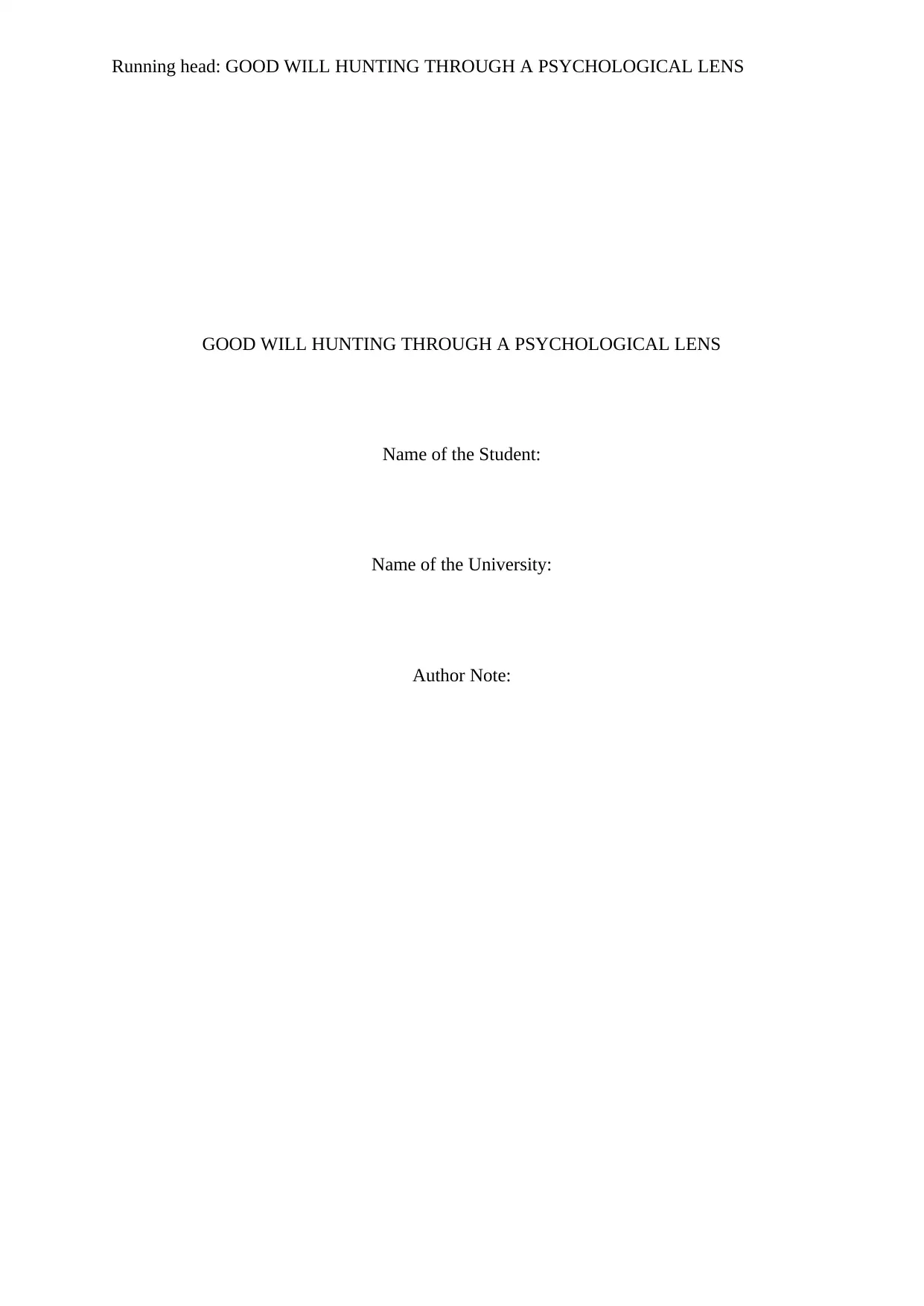
Running head: GOOD WILL HUNTING THROUGH A PSYCHOLOGICAL LENS
GOOD WILL HUNTING THROUGH A PSYCHOLOGICAL LENS
Name of the Student:
Name of the University:
Author Note:
GOOD WILL HUNTING THROUGH A PSYCHOLOGICAL LENS
Name of the Student:
Name of the University:
Author Note:
Secure Best Marks with AI Grader
Need help grading? Try our AI Grader for instant feedback on your assignments.
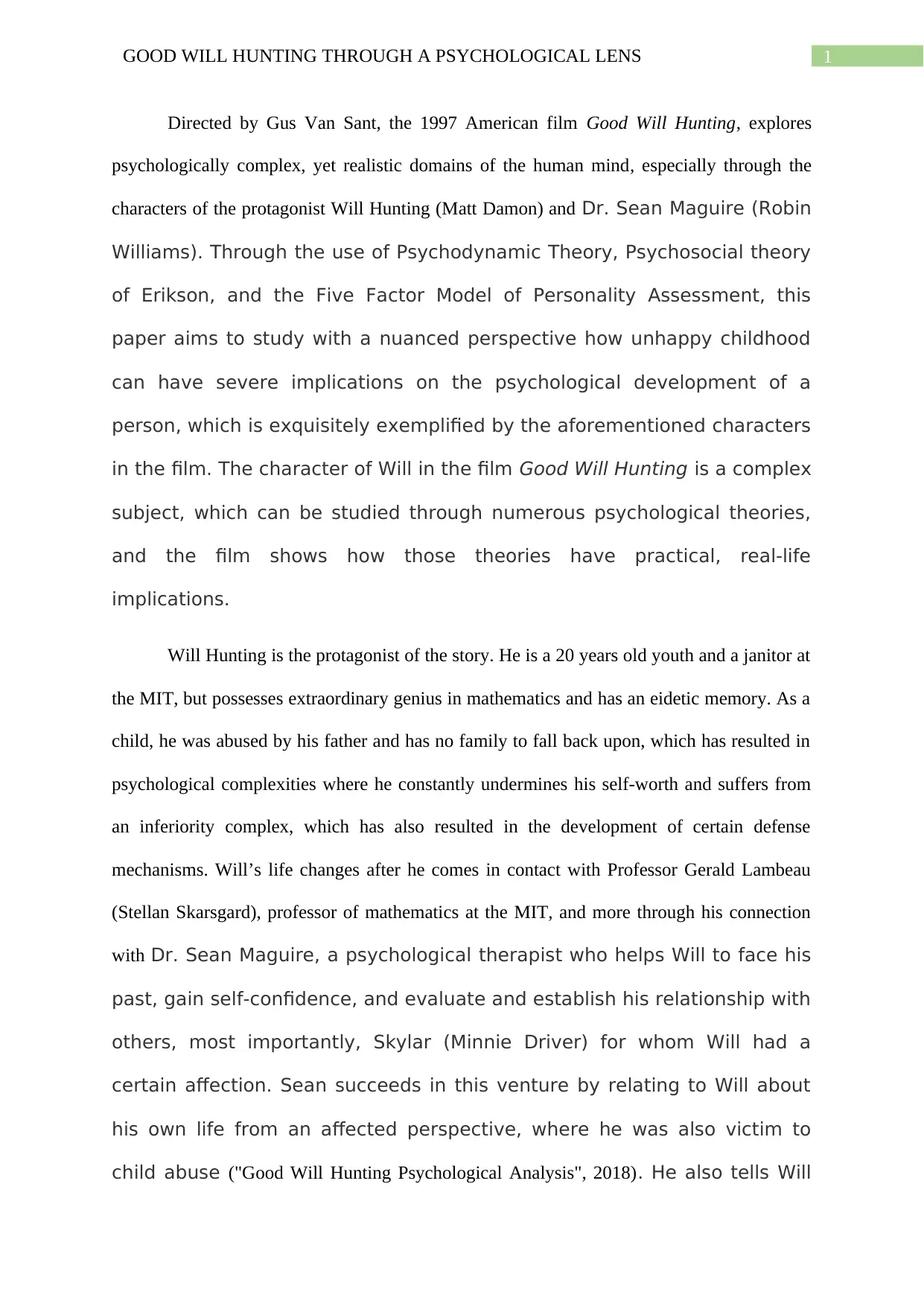
1GOOD WILL HUNTING THROUGH A PSYCHOLOGICAL LENS
Directed by Gus Van Sant, the 1997 American film Good Will Hunting, explores
psychologically complex, yet realistic domains of the human mind, especially through the
characters of the protagonist Will Hunting (Matt Damon) and Dr. Sean Maguire (Robin
Williams). Through the use of Psychodynamic Theory, Psychosocial theory
of Erikson, and the Five Factor Model of Personality Assessment, this
paper aims to study with a nuanced perspective how unhappy childhood
can have severe implications on the psychological development of a
person, which is exquisitely exemplified by the aforementioned characters
in the film. The character of Will in the film Good Will Hunting is a complex
subject, which can be studied through numerous psychological theories,
and the film shows how those theories have practical, real-life
implications.
Will Hunting is the protagonist of the story. He is a 20 years old youth and a janitor at
the MIT, but possesses extraordinary genius in mathematics and has an eidetic memory. As a
child, he was abused by his father and has no family to fall back upon, which has resulted in
psychological complexities where he constantly undermines his self-worth and suffers from
an inferiority complex, which has also resulted in the development of certain defense
mechanisms. Will’s life changes after he comes in contact with Professor Gerald Lambeau
(Stellan Skarsgard), professor of mathematics at the MIT, and more through his connection
with Dr. Sean Maguire, a psychological therapist who helps Will to face his
past, gain self-confidence, and evaluate and establish his relationship with
others, most importantly, Skylar (Minnie Driver) for whom Will had a
certain affection. Sean succeeds in this venture by relating to Will about
his own life from an affected perspective, where he was also victim to
child abuse ("Good Will Hunting Psychological Analysis", 2018). He also tells Will
Directed by Gus Van Sant, the 1997 American film Good Will Hunting, explores
psychologically complex, yet realistic domains of the human mind, especially through the
characters of the protagonist Will Hunting (Matt Damon) and Dr. Sean Maguire (Robin
Williams). Through the use of Psychodynamic Theory, Psychosocial theory
of Erikson, and the Five Factor Model of Personality Assessment, this
paper aims to study with a nuanced perspective how unhappy childhood
can have severe implications on the psychological development of a
person, which is exquisitely exemplified by the aforementioned characters
in the film. The character of Will in the film Good Will Hunting is a complex
subject, which can be studied through numerous psychological theories,
and the film shows how those theories have practical, real-life
implications.
Will Hunting is the protagonist of the story. He is a 20 years old youth and a janitor at
the MIT, but possesses extraordinary genius in mathematics and has an eidetic memory. As a
child, he was abused by his father and has no family to fall back upon, which has resulted in
psychological complexities where he constantly undermines his self-worth and suffers from
an inferiority complex, which has also resulted in the development of certain defense
mechanisms. Will’s life changes after he comes in contact with Professor Gerald Lambeau
(Stellan Skarsgard), professor of mathematics at the MIT, and more through his connection
with Dr. Sean Maguire, a psychological therapist who helps Will to face his
past, gain self-confidence, and evaluate and establish his relationship with
others, most importantly, Skylar (Minnie Driver) for whom Will had a
certain affection. Sean succeeds in this venture by relating to Will about
his own life from an affected perspective, where he was also victim to
child abuse ("Good Will Hunting Psychological Analysis", 2018). He also tells Will
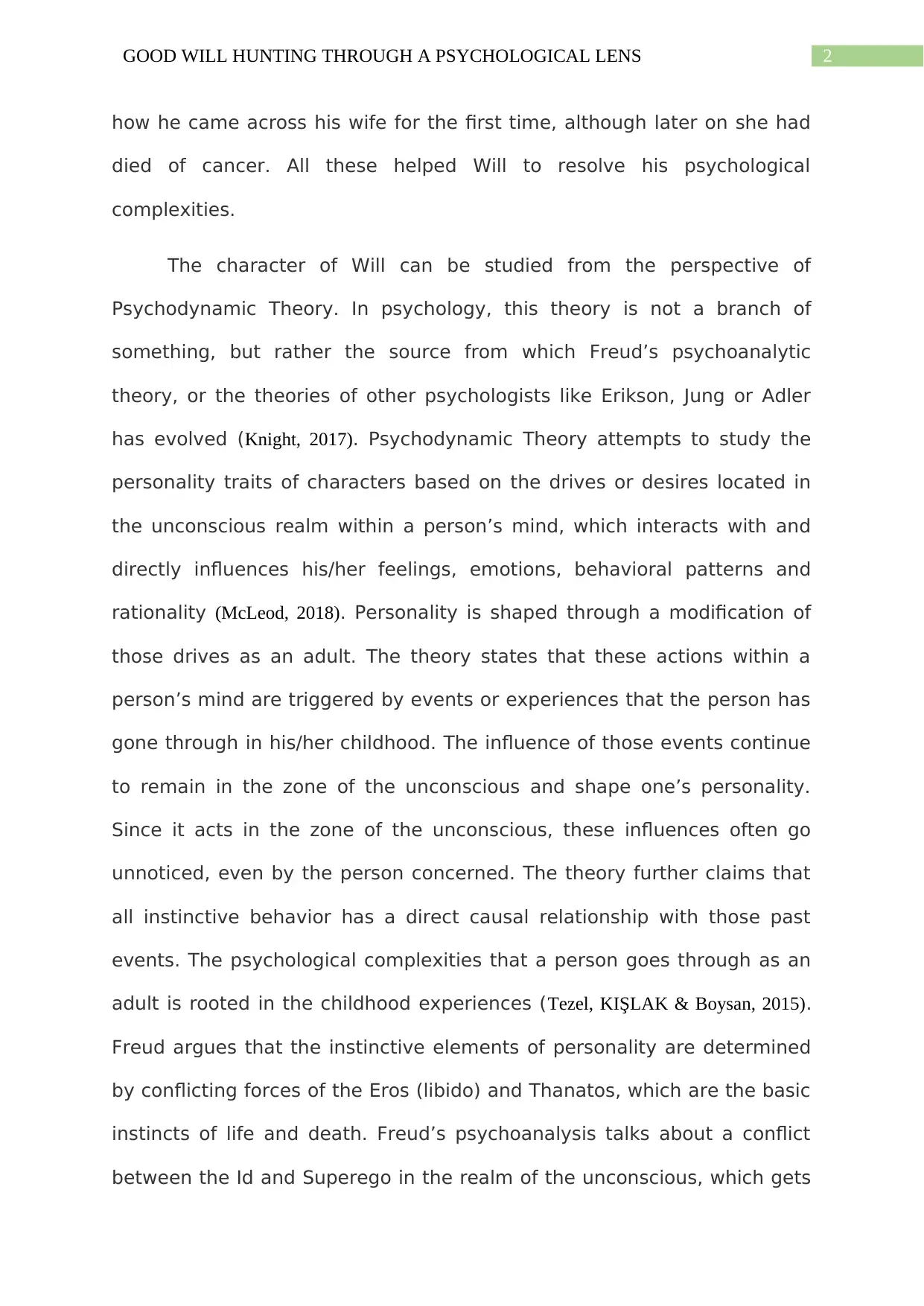
2GOOD WILL HUNTING THROUGH A PSYCHOLOGICAL LENS
how he came across his wife for the first time, although later on she had
died of cancer. All these helped Will to resolve his psychological
complexities.
The character of Will can be studied from the perspective of
Psychodynamic Theory. In psychology, this theory is not a branch of
something, but rather the source from which Freud’s psychoanalytic
theory, or the theories of other psychologists like Erikson, Jung or Adler
has evolved (Knight, 2017). Psychodynamic Theory attempts to study the
personality traits of characters based on the drives or desires located in
the unconscious realm within a person’s mind, which interacts with and
directly influences his/her feelings, emotions, behavioral patterns and
rationality (McLeod, 2018). Personality is shaped through a modification of
those drives as an adult. The theory states that these actions within a
person’s mind are triggered by events or experiences that the person has
gone through in his/her childhood. The influence of those events continue
to remain in the zone of the unconscious and shape one’s personality.
Since it acts in the zone of the unconscious, these influences often go
unnoticed, even by the person concerned. The theory further claims that
all instinctive behavior has a direct causal relationship with those past
events. The psychological complexities that a person goes through as an
adult is rooted in the childhood experiences (Tezel, KIŞLAK & Boysan, 2015).
Freud argues that the instinctive elements of personality are determined
by conflicting forces of the Eros (libido) and Thanatos, which are the basic
instincts of life and death. Freud’s psychoanalysis talks about a conflict
between the Id and Superego in the realm of the unconscious, which gets
how he came across his wife for the first time, although later on she had
died of cancer. All these helped Will to resolve his psychological
complexities.
The character of Will can be studied from the perspective of
Psychodynamic Theory. In psychology, this theory is not a branch of
something, but rather the source from which Freud’s psychoanalytic
theory, or the theories of other psychologists like Erikson, Jung or Adler
has evolved (Knight, 2017). Psychodynamic Theory attempts to study the
personality traits of characters based on the drives or desires located in
the unconscious realm within a person’s mind, which interacts with and
directly influences his/her feelings, emotions, behavioral patterns and
rationality (McLeod, 2018). Personality is shaped through a modification of
those drives as an adult. The theory states that these actions within a
person’s mind are triggered by events or experiences that the person has
gone through in his/her childhood. The influence of those events continue
to remain in the zone of the unconscious and shape one’s personality.
Since it acts in the zone of the unconscious, these influences often go
unnoticed, even by the person concerned. The theory further claims that
all instinctive behavior has a direct causal relationship with those past
events. The psychological complexities that a person goes through as an
adult is rooted in the childhood experiences (Tezel, KIŞLAK & Boysan, 2015).
Freud argues that the instinctive elements of personality are determined
by conflicting forces of the Eros (libido) and Thanatos, which are the basic
instincts of life and death. Freud’s psychoanalysis talks about a conflict
between the Id and Superego in the realm of the unconscious, which gets
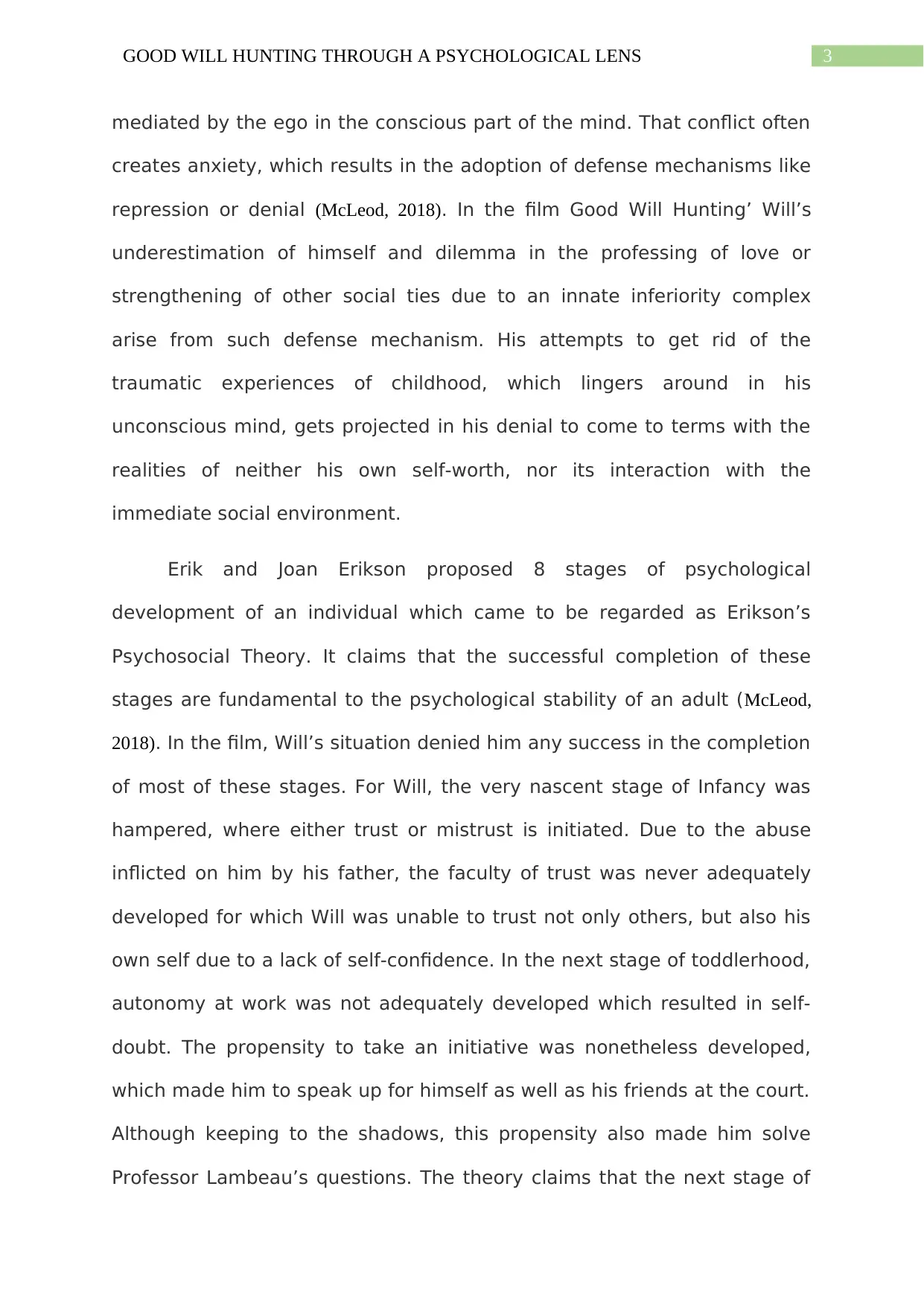
3GOOD WILL HUNTING THROUGH A PSYCHOLOGICAL LENS
mediated by the ego in the conscious part of the mind. That conflict often
creates anxiety, which results in the adoption of defense mechanisms like
repression or denial (McLeod, 2018). In the film Good Will Hunting’ Will’s
underestimation of himself and dilemma in the professing of love or
strengthening of other social ties due to an innate inferiority complex
arise from such defense mechanism. His attempts to get rid of the
traumatic experiences of childhood, which lingers around in his
unconscious mind, gets projected in his denial to come to terms with the
realities of neither his own self-worth, nor its interaction with the
immediate social environment.
Erik and Joan Erikson proposed 8 stages of psychological
development of an individual which came to be regarded as Erikson’s
Psychosocial Theory. It claims that the successful completion of these
stages are fundamental to the psychological stability of an adult (McLeod,
2018). In the film, Will’s situation denied him any success in the completion
of most of these stages. For Will, the very nascent stage of Infancy was
hampered, where either trust or mistrust is initiated. Due to the abuse
inflicted on him by his father, the faculty of trust was never adequately
developed for which Will was unable to trust not only others, but also his
own self due to a lack of self-confidence. In the next stage of toddlerhood,
autonomy at work was not adequately developed which resulted in self-
doubt. The propensity to take an initiative was nonetheless developed,
which made him to speak up for himself as well as his friends at the court.
Although keeping to the shadows, this propensity also made him solve
Professor Lambeau’s questions. The theory claims that the next stage of
mediated by the ego in the conscious part of the mind. That conflict often
creates anxiety, which results in the adoption of defense mechanisms like
repression or denial (McLeod, 2018). In the film Good Will Hunting’ Will’s
underestimation of himself and dilemma in the professing of love or
strengthening of other social ties due to an innate inferiority complex
arise from such defense mechanism. His attempts to get rid of the
traumatic experiences of childhood, which lingers around in his
unconscious mind, gets projected in his denial to come to terms with the
realities of neither his own self-worth, nor its interaction with the
immediate social environment.
Erik and Joan Erikson proposed 8 stages of psychological
development of an individual which came to be regarded as Erikson’s
Psychosocial Theory. It claims that the successful completion of these
stages are fundamental to the psychological stability of an adult (McLeod,
2018). In the film, Will’s situation denied him any success in the completion
of most of these stages. For Will, the very nascent stage of Infancy was
hampered, where either trust or mistrust is initiated. Due to the abuse
inflicted on him by his father, the faculty of trust was never adequately
developed for which Will was unable to trust not only others, but also his
own self due to a lack of self-confidence. In the next stage of toddlerhood,
autonomy at work was not adequately developed which resulted in self-
doubt. The propensity to take an initiative was nonetheless developed,
which made him to speak up for himself as well as his friends at the court.
Although keeping to the shadows, this propensity also made him solve
Professor Lambeau’s questions. The theory claims that the next stage of
Secure Best Marks with AI Grader
Need help grading? Try our AI Grader for instant feedback on your assignments.
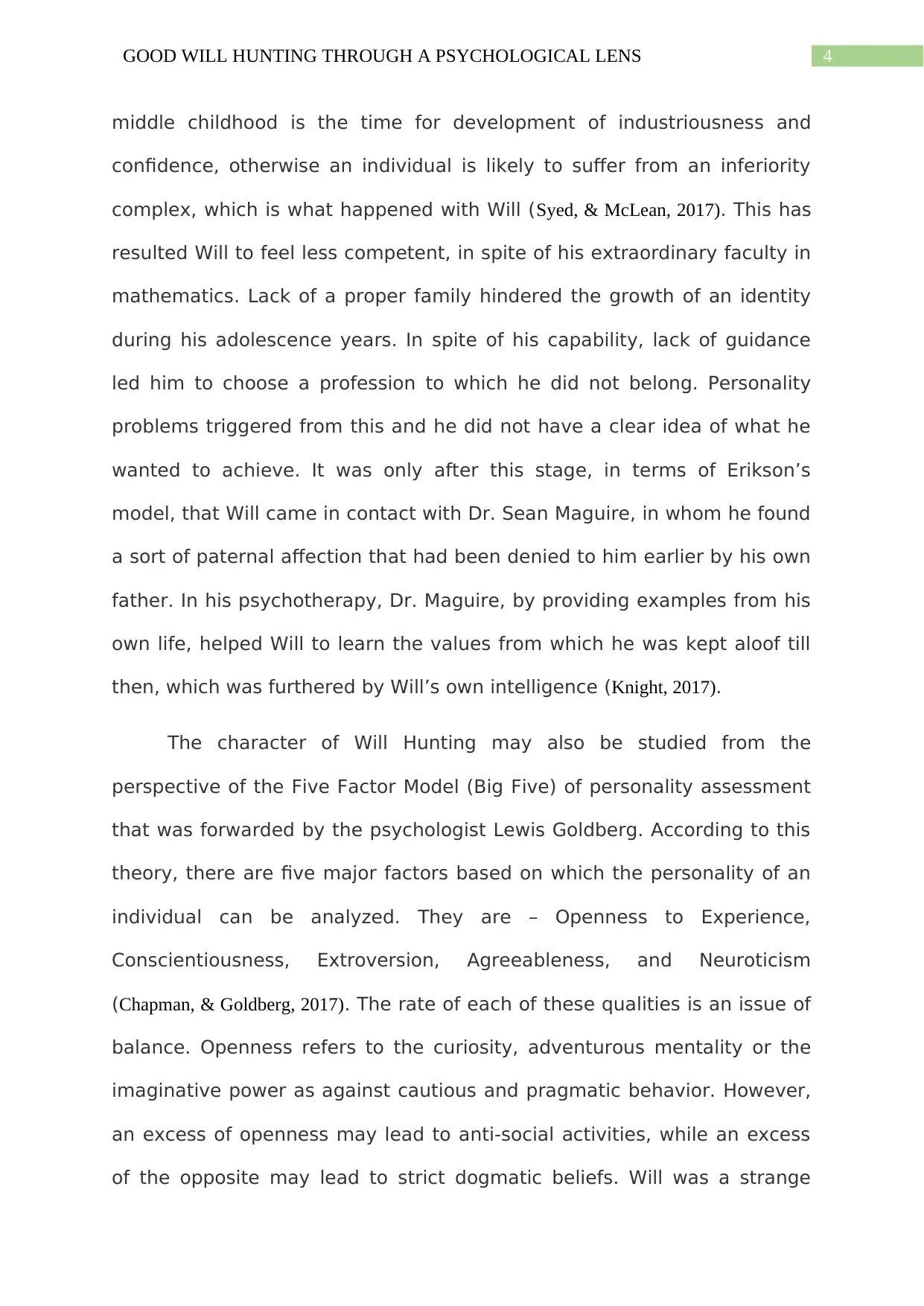
4GOOD WILL HUNTING THROUGH A PSYCHOLOGICAL LENS
middle childhood is the time for development of industriousness and
confidence, otherwise an individual is likely to suffer from an inferiority
complex, which is what happened with Will (Syed, & McLean, 2017). This has
resulted Will to feel less competent, in spite of his extraordinary faculty in
mathematics. Lack of a proper family hindered the growth of an identity
during his adolescence years. In spite of his capability, lack of guidance
led him to choose a profession to which he did not belong. Personality
problems triggered from this and he did not have a clear idea of what he
wanted to achieve. It was only after this stage, in terms of Erikson’s
model, that Will came in contact with Dr. Sean Maguire, in whom he found
a sort of paternal affection that had been denied to him earlier by his own
father. In his psychotherapy, Dr. Maguire, by providing examples from his
own life, helped Will to learn the values from which he was kept aloof till
then, which was furthered by Will’s own intelligence (Knight, 2017).
The character of Will Hunting may also be studied from the
perspective of the Five Factor Model (Big Five) of personality assessment
that was forwarded by the psychologist Lewis Goldberg. According to this
theory, there are five major factors based on which the personality of an
individual can be analyzed. They are – Openness to Experience,
Conscientiousness, Extroversion, Agreeableness, and Neuroticism
(Chapman, & Goldberg, 2017). The rate of each of these qualities is an issue of
balance. Openness refers to the curiosity, adventurous mentality or the
imaginative power as against cautious and pragmatic behavior. However,
an excess of openness may lead to anti-social activities, while an excess
of the opposite may lead to strict dogmatic beliefs. Will was a strange
middle childhood is the time for development of industriousness and
confidence, otherwise an individual is likely to suffer from an inferiority
complex, which is what happened with Will (Syed, & McLean, 2017). This has
resulted Will to feel less competent, in spite of his extraordinary faculty in
mathematics. Lack of a proper family hindered the growth of an identity
during his adolescence years. In spite of his capability, lack of guidance
led him to choose a profession to which he did not belong. Personality
problems triggered from this and he did not have a clear idea of what he
wanted to achieve. It was only after this stage, in terms of Erikson’s
model, that Will came in contact with Dr. Sean Maguire, in whom he found
a sort of paternal affection that had been denied to him earlier by his own
father. In his psychotherapy, Dr. Maguire, by providing examples from his
own life, helped Will to learn the values from which he was kept aloof till
then, which was furthered by Will’s own intelligence (Knight, 2017).
The character of Will Hunting may also be studied from the
perspective of the Five Factor Model (Big Five) of personality assessment
that was forwarded by the psychologist Lewis Goldberg. According to this
theory, there are five major factors based on which the personality of an
individual can be analyzed. They are – Openness to Experience,
Conscientiousness, Extroversion, Agreeableness, and Neuroticism
(Chapman, & Goldberg, 2017). The rate of each of these qualities is an issue of
balance. Openness refers to the curiosity, adventurous mentality or the
imaginative power as against cautious and pragmatic behavior. However,
an excess of openness may lead to anti-social activities, while an excess
of the opposite may lead to strict dogmatic beliefs. Will was a strange
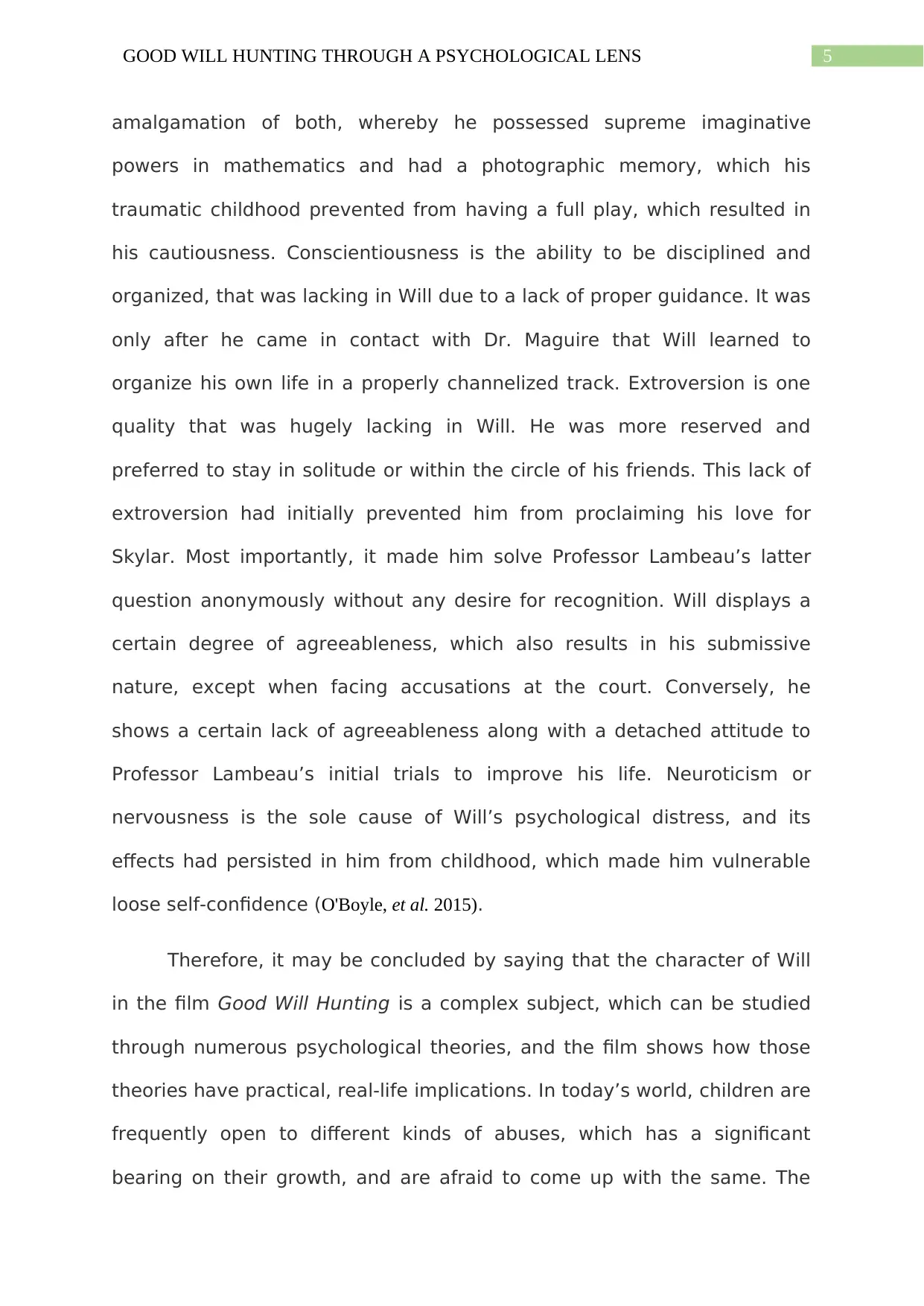
5GOOD WILL HUNTING THROUGH A PSYCHOLOGICAL LENS
amalgamation of both, whereby he possessed supreme imaginative
powers in mathematics and had a photographic memory, which his
traumatic childhood prevented from having a full play, which resulted in
his cautiousness. Conscientiousness is the ability to be disciplined and
organized, that was lacking in Will due to a lack of proper guidance. It was
only after he came in contact with Dr. Maguire that Will learned to
organize his own life in a properly channelized track. Extroversion is one
quality that was hugely lacking in Will. He was more reserved and
preferred to stay in solitude or within the circle of his friends. This lack of
extroversion had initially prevented him from proclaiming his love for
Skylar. Most importantly, it made him solve Professor Lambeau’s latter
question anonymously without any desire for recognition. Will displays a
certain degree of agreeableness, which also results in his submissive
nature, except when facing accusations at the court. Conversely, he
shows a certain lack of agreeableness along with a detached attitude to
Professor Lambeau’s initial trials to improve his life. Neuroticism or
nervousness is the sole cause of Will’s psychological distress, and its
effects had persisted in him from childhood, which made him vulnerable
loose self-confidence (O'Boyle, et al. 2015).
Therefore, it may be concluded by saying that the character of Will
in the film Good Will Hunting is a complex subject, which can be studied
through numerous psychological theories, and the film shows how those
theories have practical, real-life implications. In today’s world, children are
frequently open to different kinds of abuses, which has a significant
bearing on their growth, and are afraid to come up with the same. The
amalgamation of both, whereby he possessed supreme imaginative
powers in mathematics and had a photographic memory, which his
traumatic childhood prevented from having a full play, which resulted in
his cautiousness. Conscientiousness is the ability to be disciplined and
organized, that was lacking in Will due to a lack of proper guidance. It was
only after he came in contact with Dr. Maguire that Will learned to
organize his own life in a properly channelized track. Extroversion is one
quality that was hugely lacking in Will. He was more reserved and
preferred to stay in solitude or within the circle of his friends. This lack of
extroversion had initially prevented him from proclaiming his love for
Skylar. Most importantly, it made him solve Professor Lambeau’s latter
question anonymously without any desire for recognition. Will displays a
certain degree of agreeableness, which also results in his submissive
nature, except when facing accusations at the court. Conversely, he
shows a certain lack of agreeableness along with a detached attitude to
Professor Lambeau’s initial trials to improve his life. Neuroticism or
nervousness is the sole cause of Will’s psychological distress, and its
effects had persisted in him from childhood, which made him vulnerable
loose self-confidence (O'Boyle, et al. 2015).
Therefore, it may be concluded by saying that the character of Will
in the film Good Will Hunting is a complex subject, which can be studied
through numerous psychological theories, and the film shows how those
theories have practical, real-life implications. In today’s world, children are
frequently open to different kinds of abuses, which has a significant
bearing on their growth, and are afraid to come up with the same. The
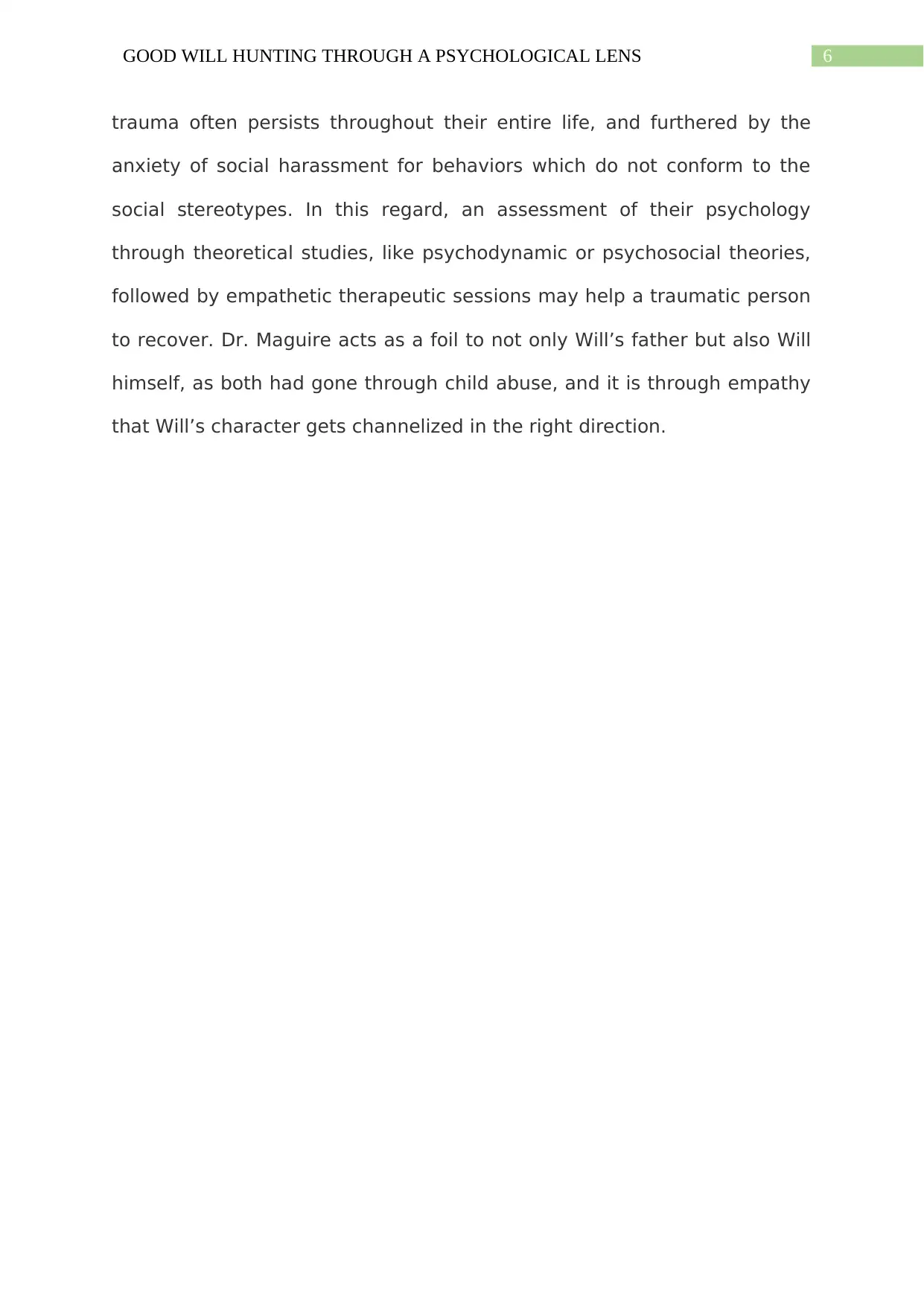
6GOOD WILL HUNTING THROUGH A PSYCHOLOGICAL LENS
trauma often persists throughout their entire life, and furthered by the
anxiety of social harassment for behaviors which do not conform to the
social stereotypes. In this regard, an assessment of their psychology
through theoretical studies, like psychodynamic or psychosocial theories,
followed by empathetic therapeutic sessions may help a traumatic person
to recover. Dr. Maguire acts as a foil to not only Will’s father but also Will
himself, as both had gone through child abuse, and it is through empathy
that Will’s character gets channelized in the right direction.
trauma often persists throughout their entire life, and furthered by the
anxiety of social harassment for behaviors which do not conform to the
social stereotypes. In this regard, an assessment of their psychology
through theoretical studies, like psychodynamic or psychosocial theories,
followed by empathetic therapeutic sessions may help a traumatic person
to recover. Dr. Maguire acts as a foil to not only Will’s father but also Will
himself, as both had gone through child abuse, and it is through empathy
that Will’s character gets channelized in the right direction.
Paraphrase This Document
Need a fresh take? Get an instant paraphrase of this document with our AI Paraphraser
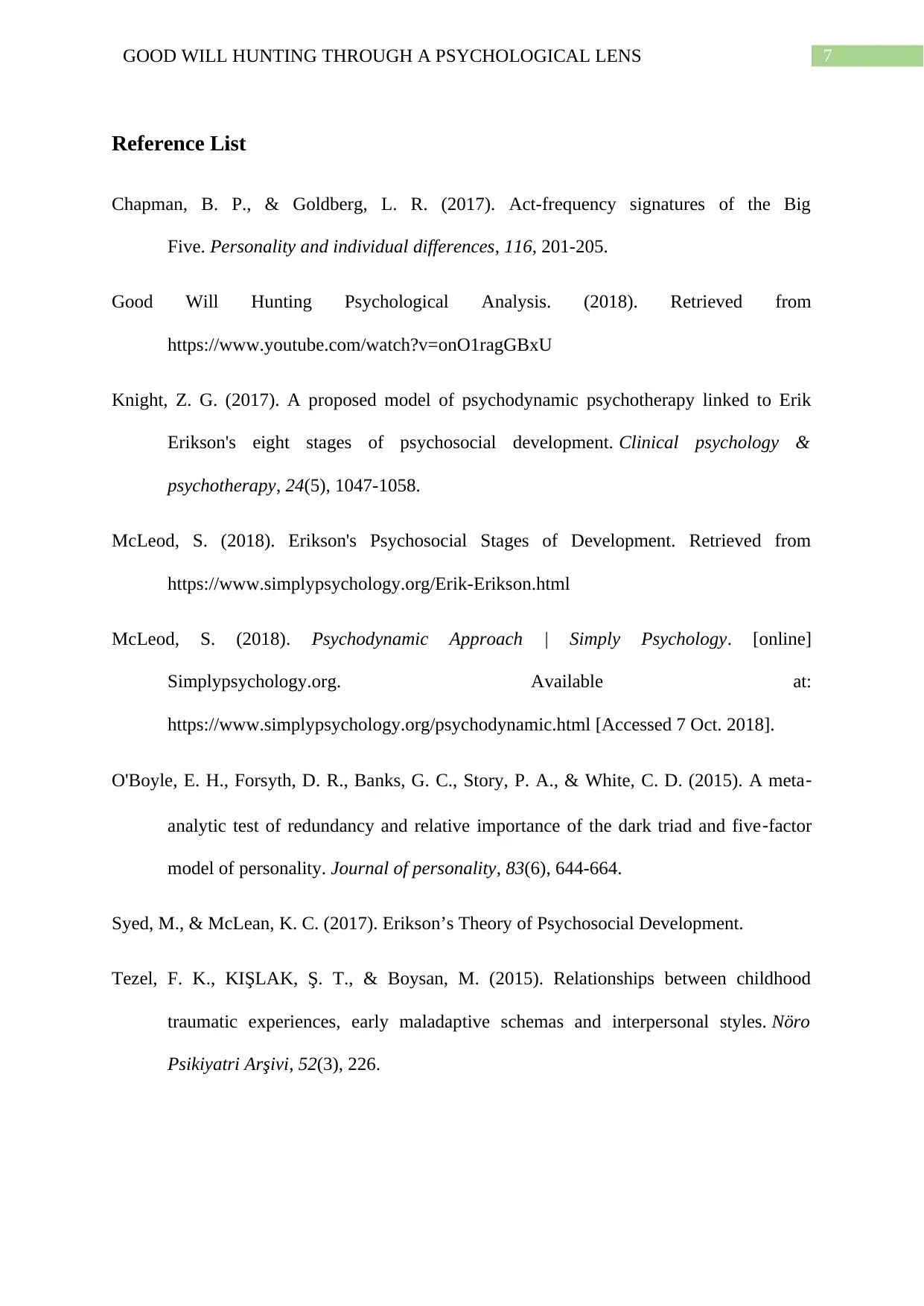
7GOOD WILL HUNTING THROUGH A PSYCHOLOGICAL LENS
Reference List
Chapman, B. P., & Goldberg, L. R. (2017). Act-frequency signatures of the Big
Five. Personality and individual differences, 116, 201-205.
Good Will Hunting Psychological Analysis. (2018). Retrieved from
https://www.youtube.com/watch?v=onO1ragGBxU
Knight, Z. G. (2017). A proposed model of psychodynamic psychotherapy linked to Erik
Erikson's eight stages of psychosocial development. Clinical psychology &
psychotherapy, 24(5), 1047-1058.
McLeod, S. (2018). Erikson's Psychosocial Stages of Development. Retrieved from
https://www.simplypsychology.org/Erik-Erikson.html
McLeod, S. (2018). Psychodynamic Approach | Simply Psychology. [online]
Simplypsychology.org. Available at:
https://www.simplypsychology.org/psychodynamic.html [Accessed 7 Oct. 2018].
O'Boyle, E. H., Forsyth, D. R., Banks, G. C., Story, P. A., & White, C. D. (2015). A meta‐
analytic test of redundancy and relative importance of the dark triad and five‐factor
model of personality. Journal of personality, 83(6), 644-664.
Syed, M., & McLean, K. C. (2017). Erikson’s Theory of Psychosocial Development.
Tezel, F. K., KIŞLAK, Ş. T., & Boysan, M. (2015). Relationships between childhood
traumatic experiences, early maladaptive schemas and interpersonal styles. Nöro
Psikiyatri Arşivi, 52(3), 226.
Reference List
Chapman, B. P., & Goldberg, L. R. (2017). Act-frequency signatures of the Big
Five. Personality and individual differences, 116, 201-205.
Good Will Hunting Psychological Analysis. (2018). Retrieved from
https://www.youtube.com/watch?v=onO1ragGBxU
Knight, Z. G. (2017). A proposed model of psychodynamic psychotherapy linked to Erik
Erikson's eight stages of psychosocial development. Clinical psychology &
psychotherapy, 24(5), 1047-1058.
McLeod, S. (2018). Erikson's Psychosocial Stages of Development. Retrieved from
https://www.simplypsychology.org/Erik-Erikson.html
McLeod, S. (2018). Psychodynamic Approach | Simply Psychology. [online]
Simplypsychology.org. Available at:
https://www.simplypsychology.org/psychodynamic.html [Accessed 7 Oct. 2018].
O'Boyle, E. H., Forsyth, D. R., Banks, G. C., Story, P. A., & White, C. D. (2015). A meta‐
analytic test of redundancy and relative importance of the dark triad and five‐factor
model of personality. Journal of personality, 83(6), 644-664.
Syed, M., & McLean, K. C. (2017). Erikson’s Theory of Psychosocial Development.
Tezel, F. K., KIŞLAK, Ş. T., & Boysan, M. (2015). Relationships between childhood
traumatic experiences, early maladaptive schemas and interpersonal styles. Nöro
Psikiyatri Arşivi, 52(3), 226.
1 out of 8
Related Documents
Your All-in-One AI-Powered Toolkit for Academic Success.
+13062052269
info@desklib.com
Available 24*7 on WhatsApp / Email
![[object Object]](/_next/static/media/star-bottom.7253800d.svg)
Unlock your academic potential
© 2024 | Zucol Services PVT LTD | All rights reserved.
